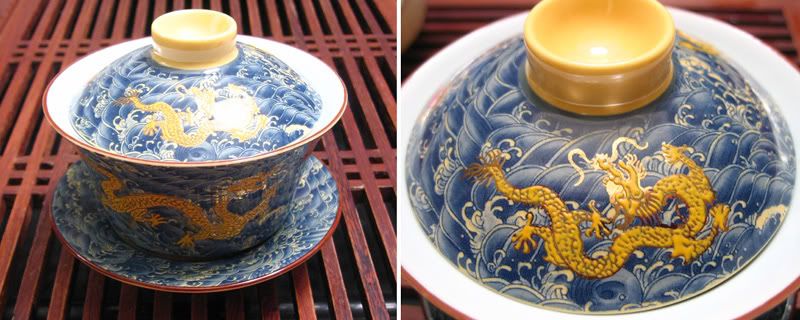
Harvest year: 2003
Producer: (unknown)
Appellation: Yiwu, Yunnan, China
Price: USD$145 per 500gr beeng
Source: Stéphane Erler of Tea Masters
Dry leaves: Visually already quite aged for a 3-year old tea. Dark brown color generally, with black leaves here and there. Silvery, hairy buds visible throughout. A very nice waft of sweet, menthol-y smell.
Wet leaves: Smells sweet and menthol-y. Salty sweet aroma.

Stéphane’s Method: less leaves, longer infusion time
In his email to me, Stéphane wrote: “The best way to brew [this tea] is light: fewer leaves and long brewing time (roughly 1 minute, 2 minutes...).” So I followed his advice and found that the resulting brew by his method was excellent! I learned a new thing.
Parameter: “small” amount of leaves in a 4oz gaiwan (not weighed, but about 1/3 of my usual habit with sheng pu-erh), flash rinse, wait 1m, and then infuse for 1m, 1m, 1.5m, 2m, 3m, 3m, 4m, 5m, 10m, 20m, 30m.
Impeccable clarity! Medium brown-reddish color, almost luminous. Subtle, mellow aromas and not bitter, even though it received a long infusion time. The menthol-y or minty characteristic of this tea really shines…it gives a pleasant cooling and tingling feeling inside the mouth and throat. Medium bodied. The texture of this tea is very smooth with sateen-like tannin. Elegant. By the third infusion, I felt sufficiently buzzed and my body warm. Good overall cha qi. Best from the 2nd to 5th infusion, after which the tea goes on to give a pleasant sweet pu-erh taste until my last 9th brew, which I gave a 30-minute infusion.
5 stars (outstanding!)
So far, it is the best young pu-erh I’ve ever tasted, regardless of price.
My Method: more leaves, shorter infusion time
Exceptional clarity! When brewed with the more-leaves-shorter-infusion method, this tea had a fruitier profile and salty ocean breeze aroma. It retained its minty and cooling traits, but somehow I felt it less than when I brewed it by Stéphane’s way. Tannin is quite pucker-y and mouth drying. Of salty sweet, plums, apricot, green apple, with a slight vegetal bitterness. Fuller bodied. Best from 3rd to 6th brew. Robust cha-qi.
4+ stars (vg – outstanding!)








 After a sad trip home for my mother’s funeral, I was elated to be back in Los Angeles to prepare for our Sophia’s 1st birthday bash! As such, last week was an incredibly hectic week…whew! On Sunday we celebrated her birthday with 20 or so close friends and family members. I had a really good time, and I believe everybody else did too despite the fact the function room’s air conditioner performed poorly in trying to stymie the summer heat.
After a sad trip home for my mother’s funeral, I was elated to be back in Los Angeles to prepare for our Sophia’s 1st birthday bash! As such, last week was an incredibly hectic week…whew! On Sunday we celebrated her birthday with 20 or so close friends and family members. I had a really good time, and I believe everybody else did too despite the fact the function room’s air conditioner performed poorly in trying to stymie the summer heat. TN: 2004 Te Whare Ra Gewürztraminer (13.8%, US$16)
TN: 2004 Te Whare Ra Gewürztraminer (13.8%, US$16) Thank you to many of you for your kind words of support during these past few difficult weeks. For those who did not know why I was away for more than 3 weeks, I had to fly to my hometown for my mother's funeral.
Thank you to many of you for your kind words of support during these past few difficult weeks. For those who did not know why I was away for more than 3 weeks, I had to fly to my hometown for my mother's funeral.